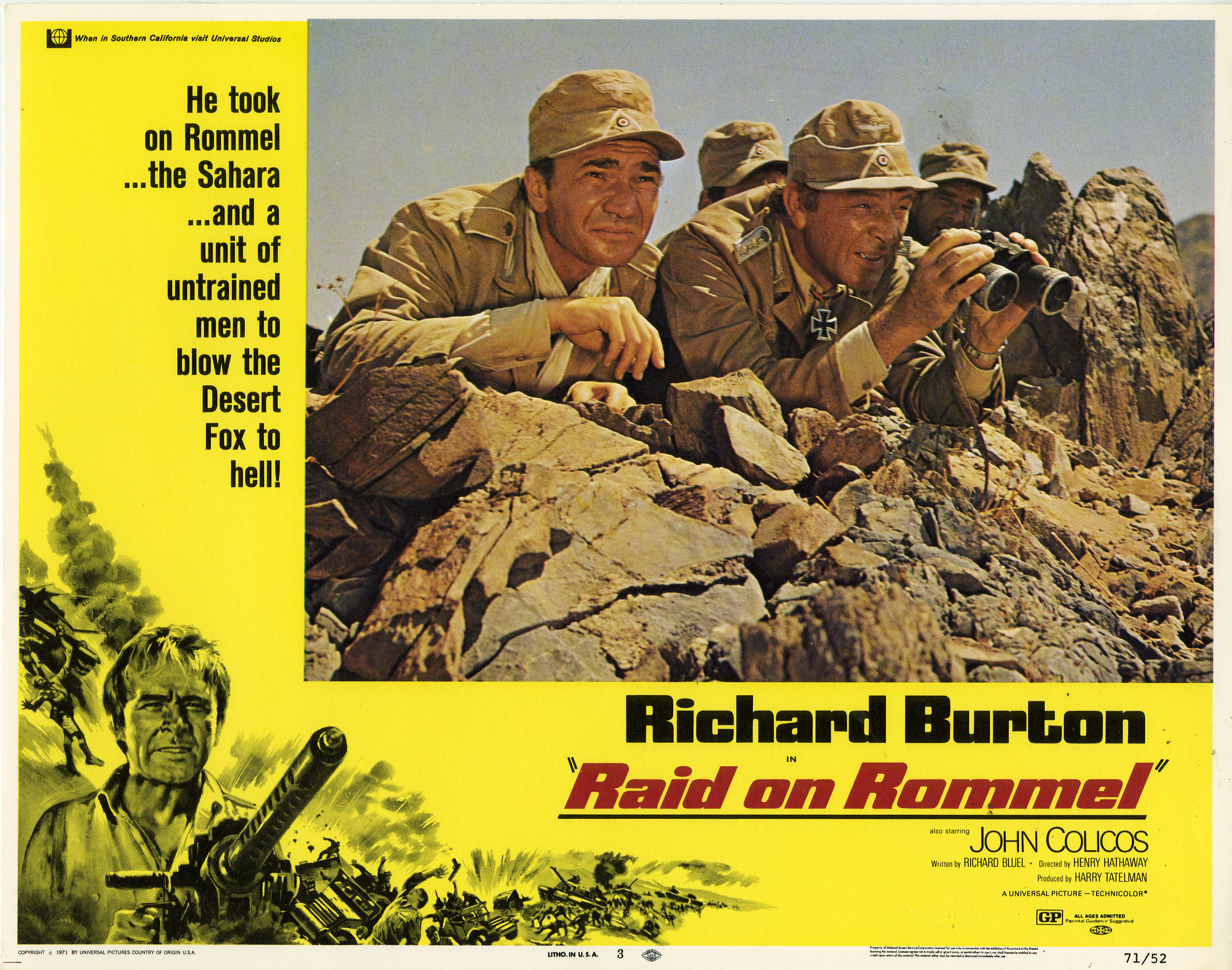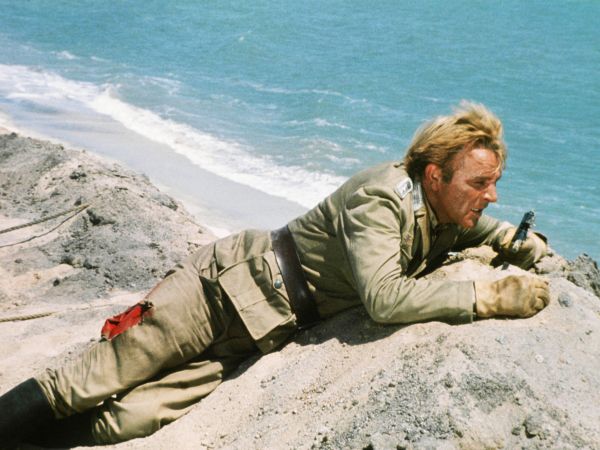
Indeed, "Major Payne" producer Harry M. Tatelman plundered the Universal Studios' stock footage archives for all of the exciting action footage from Hiller's "Tobruk" and "Ride to the Hangman's Tree" editor Gene Palmer seamlessly incorporated it into "Raid on Rommel." I would even argue that the action footage fares better in "Raid on Rommel" than in Hiller's "Tobruk." "Tobruk" was a "Guns of Navarone" clone with Rock Hudson as a Canadian and George Peppard as a German Jew fighting against the Nazis. Mind you, recycling footage in Hollywood is an age-old, time-honored practice. For example, every low-budget caveman or lost continent movie that came out of Hollywood in the 1950s exploited footage from "One Million B.C."

In "Raid on Rommel," Burton is cast as Captain Alex Foster. British Intelligence riddles a Nazi half-track with machine gun fire and Foster climbs into it and drives off into the desert seemingly oblivious as to his destination. Later, a Nazi convoy ferrying sick P.O.W.s discovers Foster and picks him up. Initially, Major Hugh Tarkington (Clinton Greyn of "Robbery") knows that Foster isn't suffering from heat exhaustion, but he warns him that he wants to know his orders. Foster reveals his mission to Tarkington, only to learn that he has stumbled onto the wrong convoy. Instead of seasoned commandos at his disposal, he has the sick and the injured. Boy, is Foster upset and Tarkington isn't inclined to help him. Eventually, Tarkington changes his mind.

Meanwhile, Foster manages to make something of the men at his disposal thanks largely to Sgt. Maj. Allan MacKenzie (John Colios of "Scorpio") and the British overpower their Nazi captors and disguise themselves as the enemy. Talk about improvising! On their way to Tobruk, Foster and MacKenzie give their men a boot camp in firing mortars and rappelling down ropes by slinging them to the sides of the personnel carriers. Along the way, they pick up a civilian and a beautiful woman and use them as a part of their masquerade. Our valiant heroes enter Tobruk, meet Rommel at his headquarters where Foster learns the whereabouts of a fuel depot, and then they blow everything to hell and gone. The scene at Rommel's headquarters is especially neat because Tarkington gets into a polite argument with a cultured Rommel about collecting postage stamps, thereby giving Foster—disguised as a Nazi officer—time to study secret German maps.

No, "Raid on Rommel" is not the most historically accurate World War II film by any stretch of the imagination. However, few films produced about historical events are faithful to history. If you see a movie to get the facts straight, you're a misguided soul. Hollywood doesn't specialize in history lessons; movie makers want to entertain us first and then second strive for accuracy. During the last half of the 20th century, all World War II movies contained historically inaccurate equipment. American 'Cold War' army tanks usually masqueraded as Nazi Tiger Tanks and vintage Navy propeller driven fighters doubled for Japanese Zeroes. As far as that goes, most filmmakers ignored the fact that Nazis spoke German and Hitler's madmen uttered their lines with obvious ersatz accents. These problems became conventions largely because American audiences couldn't speak the foreign dialects and subtitles were confined to foreign art films. "Raid on Rommel" contains one of the most obvious conventions of World War II movies that "Catch-22" changed. During one scene, an Allied P-40 Tomahawk fighter attacks the Nazi convoy that Foster has joined. The enemy manages to hit the fighter and it streaks off, pouring smoke, and crashes behind a sand dune with a fireball explosion rolling heavenward to mark its demise. Of course, the producers no more than the owner of that vintage plane were about to destroy it for this inconsequential movie. In "Catch-22," you actually get to see a plane crash nose first into the side of mountain!

Meanwhile, the significance of "Raid on Rommel" is undoubtedly lost on today's audience. In 1951, Hathaway helmed an ahead-of-its-time World War II biography "The Desert Fox" and portrayed Rommel (James Mason) in sympathetic terms. In fact, Hathaway's portrait of Rommel proved too sympathetic and most film critics scourged Twentieth Century Fox for this depiction. A couple of years later to set the record straight, Mason reprised his role as Rommel in "The Desert Rats" and he was not accorded the sympathy that outraged critics in the Hathaway gem. Read the major reviews of "The Desert Fox" in Time, Newsweek, and the New York Times and you will see for yourself that Hathaway stirred up controversy.
Yes, "Raid on Rommel" is a potboiler of sorts, probably memorable to World War II fans more for Hathaway's brief but sympathetic Rommel scene and for—according to one Burton biographer—Burton's sober performance. He didn't drink a drop while he was acting, but then crusty old Henry Hathaway, who never gave any actor a break, probably kept his eye on the Welshman. The performances are standard and one of the most respected Bavarian actors who specialized in playing German officers—Wolfgang Preiss—plays Field Marshal Rommel.


No comments:
Post a Comment